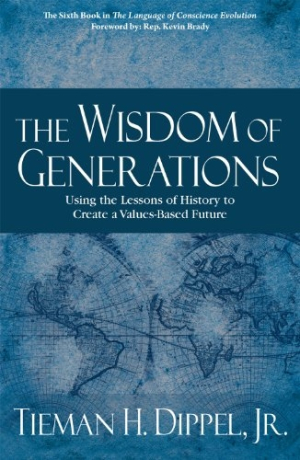The Wisdom of Generations
Using the Lessons of History to Create a Values-Based Future
- 2012 INDIES Winner
- Bronze, Philosophy (Adult Nonfiction)
- 2012 INDIES Finalist
- Finalist, Political Science (Adult Nonfiction)
Tieman H. Dippel’s The Language of Conscience Evolution Series, beginning with the first book, The New Legacy (published twice in the late eighties and republished in 2002), and continuing with the sixth and latest volume in the series, The Wisdom of Generations, is a thriving organism that adapts to continuous change. Dippel’s series emphasizes that all ethical, monetary, and other decisions made by individuals, families, corporations, or governments should be based on conscience, not convenience.
According to Dippel, dramatic transitions in the last sixty years have culminated with our current adulterated global model dominated by economics, politics, and culture. Dippel claims this cycle of politics started in the 1960s when market economies during the Kennedy and Johnson era clashed with Khrushchev’s and Mao’s centralized planning policies. Western science and technology emphasized a power cycle of economics during the Reagan and Thatcher era, which gave market economies an edge over Gorbachev’s and Deng’s policies. Now, Dippel believes the power of economics has given way to the power of culture, and society has devolved to where fraudulence, avarice, and terrorism are commonplace and an accepted norm.
Even though Dippel has a down-home, easygoing presentation, he is an excellent teacher and his extraordinary intelligence is clearly conveyed. His books touch upon the interconnections of subjects like values and ethics, philosophy, culture, economics, and world history. Written for business professionals and politicians, the book’s ideas require deep contemplation, but can be applied to all walks of life. A prime example is the way people currently think of the terms “liberal” and “conservative.” Dippel writes, “Conservatism and liberalism are now nouns describing positions such as taxation. In the past and probably the future, they will again become adjectives of thought rather than absolutes.”
The Wisdom of Generations is structured into two main parts that are equally important and enhance and complement each other. The first part, “The Family Must Set the Moral Compass,” explains how individuals see and relate to the world in relation to his or her family’s experiences and traditions. Entitled “Creating a Map To Navigate the Modern World,” the volume’s second part discusses how to use the knowledge from the previous section to help understand and live in a world that is in a constant state of flux.
Dippel started the series to bridge the gap between the American and Chinese cultures by finding similarities in values expressed through truisms like the Christian Golden Rule and the Chinese equivalent, the Silver Rule of Confucius. This book reports on the results of joint American and Chinese cultural exchanges that originated with China adopting Dippel’s work. In 2004, China’s Central Party School published the Chinese version of The Language of Conscience.
The sixth volume in the series is also Dippel’s legacy to his descendants. Using wisdom that was passed down from his grandfather, Dippel enriches the legacy with his own experiences. He writes, “Several generations always determine the future of the society. The responsibility is yours—what you do for your children even if those generations preceding you failed in many aspects.”
Reviewed by
Lee Gooden
Disclosure: This article is not an endorsement, but a review. The publisher of this book provided free copies of the book and paid a small fee to have their book reviewed by a professional reviewer. Foreword Reviews and Clarion Reviews make no guarantee that the publisher will receive a positive review. Foreword Magazine, Inc. is disclosing this in accordance with the Federal Trade Commission’s 16 CFR, Part 255.

